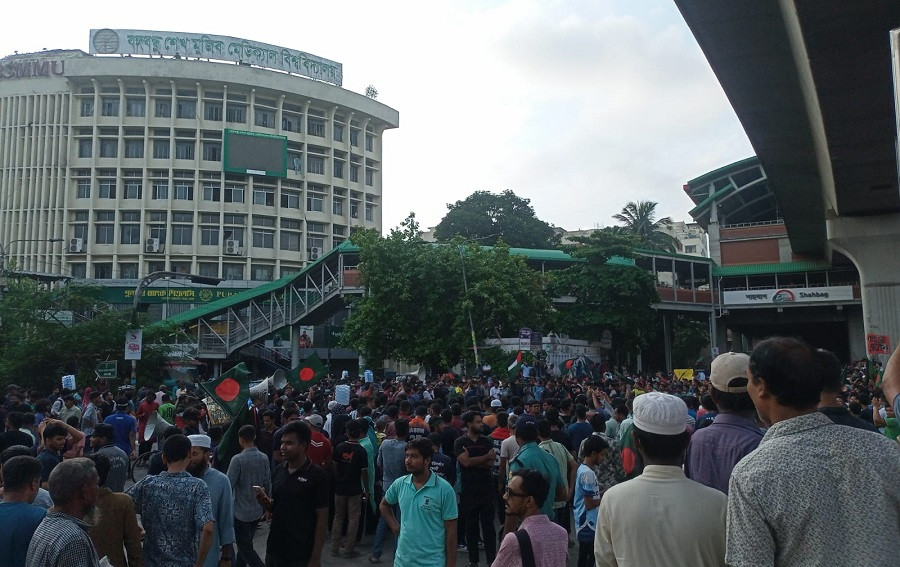
File Photo: Daily Sun
The velocity of the anti-quota movement turning into “Bangla Blockade” from dawn to dusk is but a tempest in a teapot. The anti-quota protestors seem to be tilting at windmills. They are fulminating against the freedom fighter’s quota in the government jobs. But the government under Sheikh Hasina had abolished it back in 2018 in response to the demand of the students. Now the quota has recently been reinstated by a decree of the High Court. The government is still sticking to its previous decision about the annulment of the freedom fighters' quota. In addition, while the lawsuit was brought against the government decision of abolishing the quota, the government side defended itself in the case arguing in favour of the abolition of the quota, but they were defeated in the court and the freedom fighters’ quota returned to its former position.
At present, the Supreme Court has suspended the freedom fighters' quota reinstatement order for a month, and the Chief Justice himself has requested the agitating students to return to class accepting the court directive. But the students continue staging demonstrations. The government seems, on the one hand, to be waiting for the court’s final verdict on the quota issue and also to be ready to discuss any further necessary actions for the welfare of the students and the country on the other. They are urging the protestors not to be involved in any external instigation and to resolve the issue through a constructive dialogue. If still any agitation in the name of anti-quota movement continues to happen, it would be very unfortunate.
The freedom fighters are the best children of the nation. Many of them made the supreme sacrifice and many more were seriously injured in the liberation war. The quota system for the valiant freedom fighters and their children, introduced as per the Constitution, is always highly prestigious. Regretfully, it was abrogated after Bangabandhu was assassinated in 1975 and remained suspended until 1995. In 1996 it came into vogue after Sheikh Hasina assumed power. Again from 2001 to 2008, during the regimes of BNP-Jamaat coalition and Caretaker Government the freedom fighters’ children were deprived of the quota. And this total deprivation is past compensation.
That the beneficiaries of the freedom fighters' quota are being treated ‘untalented’ is a very depressing fact. As far as Bangladesh public service commission jobs are concerned, the quota candidates also have to compete with the general candidates in almost all the stages.
As far as other kinds of quota are concerned, many of them are essential given the spirit of inclusive and sustainable development. How could one think of inclusivity in the overall development of the country without providing equitable access to opportunities and resources for people who might otherwise be excluded or marginalised—such as those having physical or intellectual disabilities or belonging to minority groups or who are in a weaker position than others and therefore not likely to be successful. Statistics show that participation of women has remarkably decreased in the 40th, 41st, and 43rd BCS examinations. In the 38th BCS exams, more than 26% of women entered the workforce on average while in subsequent ones it dropped to 19%. If this gradual downtrend is not compensated by any kind of facility, the nation’s goals of gender empowerment, inclusivity and sustainable development will not be achieved.
So far as history is concerned, in the wake of the World War II, a provision of quota was introduced for Indian candidates in the Imperial Civil Service (ICS) following a British parliamentary resolution. The aim was to create a coordination of 40% European and 40% Indian officers, and 20% officers promoted from the Provincial Civil Service. The British government also made provisions for directly recruiting from Indian minorities such as Muslims, to ensure fair representation of all in the ICS. The quota system continued to exist in newly independent Bangladesh to meet the needs of the hour. 30% of the government jobs were reserved for freedom fighters, 10% for women affected in the Liberation War, and 40% for people of different districts which left only 20% for merit positions (The Daily Star, Jul 10, 2024).
The system of quota in the government jobs was well justified by our Constitution. Article 28(4) of the Bangladesh Constitution ensures that “nothing shall prevent the State from making special provision in favour of women or children or for the advancement of any backward section of citizens.” Article 29(3) (a) confirms “making special provision in favour of any backward section of citizens for the purpose of securing their adequate representation in the service of the Republic.”
A quota system is not always an antithesis of meritocracy. It does not necessarily mean to recruit ineligible people. This is rather to make sure that people from different places, conditions and communities are treated equitably. ‘Equitable’ is a keyword in the SDG dictionary. This is also the spirit of a pluralistic society. We are working towards a world where no one should be left behind.
_____________________________________
Dr. Rashid Askari is a former vice chancellor of Islamic University Bangladesh

